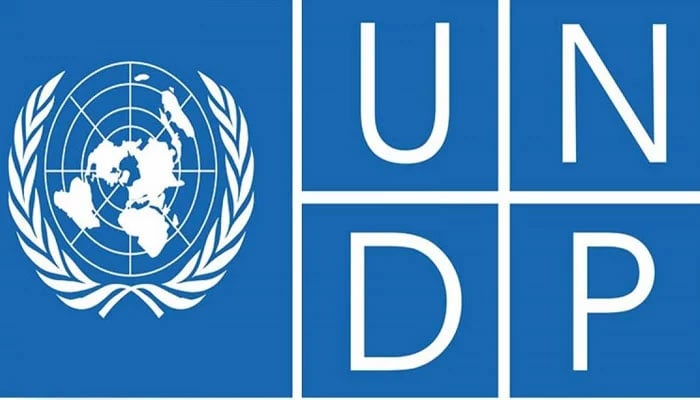Financial literacy can uplift private sector in merged areas: UN report
PESHAWAR: To understand the business landscape and analyse factors limiting access to finance for small and medium enterprises in merged areas, the government of Khyber Pakhtunkhwa and United Nations Development Program (UNDP)’s Merged Areas Governance Project (MAGP) collaborated on a detailed analytical report titled “Access to Finance for Private Sector Development in the Merged Areas,” launched here on Thursday.
The report finds that formal financial services in the merged areas is one of the lowest in Pakistan. There are a total of 81 bank branches across the seven districts, making the total branches in the region amounting to less than 5% of all branches in KP.
Limited formal banking facilities hamper private sector activity, thereby adversely affecting job creation and economic growth. Furthermore, the report highlights the need to strengthen regulatory frameworks and boost bank lending to businesses in the merged areas. The MAGP Senior Sector Specialist for Small Enterprises Ahmad Umair recommended expanding existing loan schemes by the government such as Kamyab Jawan and Insaf Rozgar.
“There is a need to review criteria and relax minimum educational standards for credit services for youth of the merged districts,” he said, adding that the youth couldn’t complete their education during the years 2002 and 2015 as instability and security turmoil rocked the region. “Lack of education is acting as a major impediment in their entrepreneurial journey.”
MAGP Programme Manager Raluca Eddon reiterated UNDP’s commitment in supporting the KP government in continued integration and development of the merged areas. She called for an active involvement of all stakeholders, including the government, development partners and the private sector to support the banking sector in ensuring widespread access to finance, especially for women and vulnerable groups.
“By increasing reach of existing loan schemes and microfinance, introducing targeted financial products, and facilitating access to credit information, we can propel the development of a conducive business environment and help local businesses grow,” she added.
In closing remarks, Secretary Industries, Commerce & Technical Education Department Khyber Pakhtunkhwa Humayun Khan highlighted the need to partner with other stakeholders such as the State Bank, the Securities and Exchange Commission of Pakistan and other financial institutions to foster increased access to financing and regulatory support to local businesses.
“The findings of this report are highly beneficial to develop private sector in the merged areas. Post-merger, we devised a 10-year-long Tribal Decade Strategy and set aside the first three years to focus on various interventions. In the coming seven years, we aim to concentrate on improving access to finance and bank lending in the region,” he added.
-
 Critics Target Palace Narrative After Andrew's Controversy Refuses To Die
Critics Target Palace Narrative After Andrew's Controversy Refuses To Die -
 Sarah Ferguson’s Delusions Take A Turn For The Worse: ‘She’s Been Deserted’
Sarah Ferguson’s Delusions Take A Turn For The Worse: ‘She’s Been Deserted’ -
 ICE Agents 'fake Car Trouble' To Arrest Minnesota Man, Family Says
ICE Agents 'fake Car Trouble' To Arrest Minnesota Man, Family Says -
 Camila Mendes Reveals How She Prepared For Her Role In 'Idiotka'
Camila Mendes Reveals How She Prepared For Her Role In 'Idiotka' -
 China Confirms Visa-free Travel For UK, Canada Nationals
China Confirms Visa-free Travel For UK, Canada Nationals -
 Inside Sarah Ferguson, Andrew Windsor's Emotional Collapse After Epstein Fallout
Inside Sarah Ferguson, Andrew Windsor's Emotional Collapse After Epstein Fallout -
 Bad Bunny's Star Power Explodes Tourism Searches For His Hometown
Bad Bunny's Star Power Explodes Tourism Searches For His Hometown -
 Jennifer Aniston Gives Peek Into Love Life With Cryptic Snap Of Jim Curtis
Jennifer Aniston Gives Peek Into Love Life With Cryptic Snap Of Jim Curtis -
 Prince Harry Turns Diana Into Content: ‘It Would Have Appalled Her To Be Repackaged For Profit’
Prince Harry Turns Diana Into Content: ‘It Would Have Appalled Her To Be Repackaged For Profit’ -
 Prince William's Love For His Three Children Revealed During Family Crisis
Prince William's Love For His Three Children Revealed During Family Crisis -
 Murder Suspect Kills Himself After Woman Found Dead In Missouri
Murder Suspect Kills Himself After Woman Found Dead In Missouri -
 Sarah Ferguson's Plea To Jeffrey Epstein Exposed In New Files
Sarah Ferguson's Plea To Jeffrey Epstein Exposed In New Files -
 Prince William Prepares For War Against Prince Harry: Nothing Is Off The Table Not Legal Ways Or His Influence
Prince William Prepares For War Against Prince Harry: Nothing Is Off The Table Not Legal Ways Or His Influence -
 'How To Get Away With Murder' Star Karla Souza Is Still Friends With THIS Costar
'How To Get Away With Murder' Star Karla Souza Is Still Friends With THIS Costar -
 Pal Reveals Prince William’s ‘disorienting’ Turmoil Over Kate’s Cancer: ‘You Saw In His Eyes & The Way He Held Himself’
Pal Reveals Prince William’s ‘disorienting’ Turmoil Over Kate’s Cancer: ‘You Saw In His Eyes & The Way He Held Himself’ -
 Poll Reveals Majority Of Americans' Views On Bad Bunny
Poll Reveals Majority Of Americans' Views On Bad Bunny




